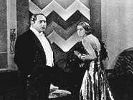Eye For Film >> Movies >> L'Argent (1928) Film Review
It may be 80 years since Marcel L’Herbier’s masterpiece first graced the silver screen, but it has never been more relevant than it is right now. With its vicious critique of greedy, corrupt bankers, the fickle nature of the stock market, and the perils of speculative financial rumour-mongering, this is truly a tale for our times. A widely acknowledged classic of the silent era, L’Argent is an innovative and ambitious piece of cinema which truly deserves its place as part of Eureka's Masters of Cinema series.
Based on a novel by the great 19th Century French novelist, Émile Zola, L’Argent tells of the fluctuating fortunes of avaricious banker Nicolas Saccard (Pierre Alcover), owner of the Banque Universelle. Having been outmanoeuvred by his great rival, oil tycoon Alphonse Gunderman (Alfred Abel), Saccard attempts to revive the fortunes of his ailing bank by financing the record-breaking transatlantic flight of pioneering explorer and aviator extraordinaire, Jacques Hamelin (Henri Victor). Having sent Hamelin off on his expedition to French Guyana to drill for oil, Saccard then sets his sights on Hamelin’s beautiful but vulnerable wife, Line (Marie Glory), all the while playing devious games with his shareholders in an attempt to falsely inflate the value of the Banque Universelle.

Given the film’s moralising tone and the director’s obvious disdain for the actions of Saccard, the outcome is not difficult to guess, but the drama lies in the uncertainty of the build-up and the fate of the other characters who have been drawn into Saccard’s web of deceit. The ending itself also packs a clever little twist which is entirely in keeping with the theme of money’s corrupting influence on human nature. Saccard is unquestionably the villain of the piece but Alcover’s theatrical, larger-than-life performance also makes him the most captivating, magnetic character in the story.
The silent film era inevitably imposed very different demands on actors and as a result the acting is markedly more demonstrative and expressive. But once the modern viewer is able to accept the necessity of this theatricality, then there are some impressive performances here, notably Alcover’s turn as the amoral, devious Saccard, Brigette Helm as sexy, manipulative Baroness Sandorf and Glory as the vulnerable beauty, Line Hamelin.
But for all of the acting prowess on show here, there is no doubting the film’s real star, Marcel L’Herbier himself, the omnipresent puppet-master pulling the strings from behind the scenes. A true cinematic artiste, L’Herbier is clearly fascinated with the aesthetic beauty of cinema and the director’s art. Both the oil tycoon Grunderman and the adventurer-cum-pioneering aviator Jacques Hamelin are presented as on-screen parallels for the director – the one for his power and prestige, the other for his innovation and spirit of adventure. These qualities are certainly on display in L’Argent, as L’Herbier constantly experiments with the medium of cinema. From the lavish interior of Saccard’s Party as the camera pans expertly across the top of the room through to the famous scene inside the Paris stock exchange in which the camera looks down on the dizzying anthill of activity before spinning disorientatingly downwards into the crowd, L’Argent is a groundbreaking piece of celluloid history.
For me this was a truly captivating, inspired cinematic experience, which really struck a chord with my passion for cinema. Anyone seeking to experience and understand the beauty of silent film and, indeed, the aesthetic pleasure and artistic merit of cinema before the advent of sound, would do very well to watch this film.
Reviewed on: 30 Nov 2008

















